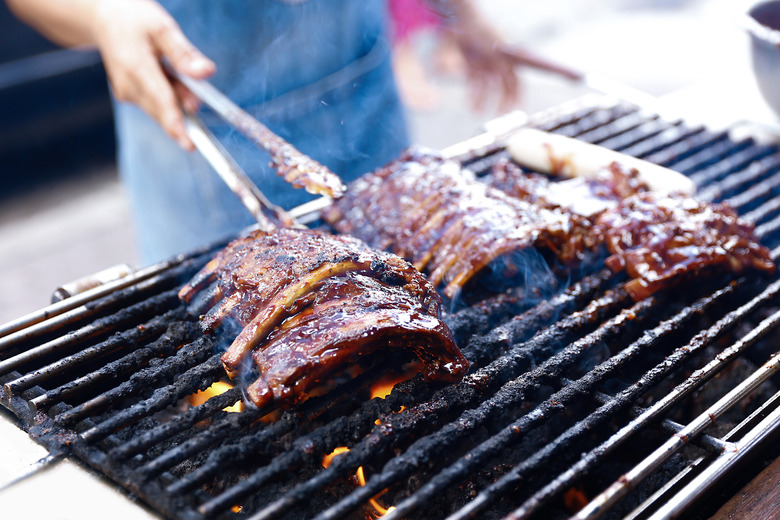Summer Barbecues Could Expose Your Skin To Carcinogens, Study Says
Even if you don't breathe it in, smoke from your barbecue could be putting you at risk, according to a new study published in the journal Environmental Science & Technology. The researchers looked to investigate class of likely carcinogens called polycyclic aromatic hydrocarbons (PAHs) they say can waft from your grill and actually be absorbed through your skin.
For this study, researchers in China set up an outdoor barbecue with a grill, placing 20 participants at varying distances from the flame. They also varied the amount of food eaten from the grill, which could expose participants to even more carcinogenic compounds. Urine samples were collected and tested for PAH presence.
They found that the greatest amount of PAH exposure occurred in attendants who ate the grilled food. But even if you abstain from eating anything off the grill, this study suggests you could still be at risk. It's worth noting that the study only involved a small sample of participants and does not remotely prove any causal relationship between cancer and skin exposure to smoke.
Researchers were slightly surprised to find that a significant amount of PAHs were absorbed through the skin — even among those who directly inhaled barbecue smoke, the majority of PAH exposure was attributable to dermal absorption. The skin absorbed chemicals from the grill even from a distance, meaning everyone at the barbecue was exposed to potentially harmful amounts of smoke.
According to the federal Agency for Toxic Substances and Disease Registry, PAHs have been linked to an increased risk of skin, lung, bladder, and gastrointestinal cancers, though it's difficult to isolate these effects to PAHs since exposure often occurs in combination with other chemicals. Previous studies highlighted the potential for consuming carcinogens from the char marks of grilled food. But the dangers of absorption through the skin, the researchers say, "seem to have been largely overlooked."
However, "for the average person, it's not likely to end up being a real major worry, since most people don't engage in this activity all the time," Dr. Kenneth Spaeth, chief of occupational and environmental medicine at Northwell Health in Great Neck, New York, told LiveScience.
Protecting yourself from billows of grill smoke isn't so simple, if you do choose to do what you can to mitigate your risk. Wearing long sleeves and pants may help, reported LiveScience — but only for a short period of time. PAHs quickly saturate the fibers of your clothes, according to further testing from the Chinese study. Your porous skin is then at risk for soaking up the chemicals until you change your outfit.
Your best bet for avoiding PAHs is to stay inside. If you're the one manning the grill, the researchers recommend wearing protective clothing while you cook and changing immediately afterward.
The dangers may actually be more concentrated in the consumption of meat that's been charred. "While the exact mechanism for increased risk of colorectal cancer with consumption of red and processed meat is unknown, PAHs and other carcinogens formed during grilling, barbecuing, curing or smoking of meats may contribute to this risk," Dr. Marjorie Lynn McCullough, senior scientific director of epidemiology research for the American Cancer Society, told The Daily Meal via email. "Cooking meat by broiling and baking forms fewer carcinogens than cooking at high heat by pan frying and grilling, especially over open flames."
There are ways to reduce the amount of carcinogen exposure from grilled meats, McCullough explained. "Using citrus marinades may help reduce formation of some carcinogens during cooking," she said, "and partially pre-cooking meat before 'finishing off” on the grill may also reduce carcinogen exposure."
But if you're going to eat anything that was cooked on the grill, it's unlikely you'll completely avoid the risk of consuming carcinogens. You might want to stick to the healthy side dishes.
